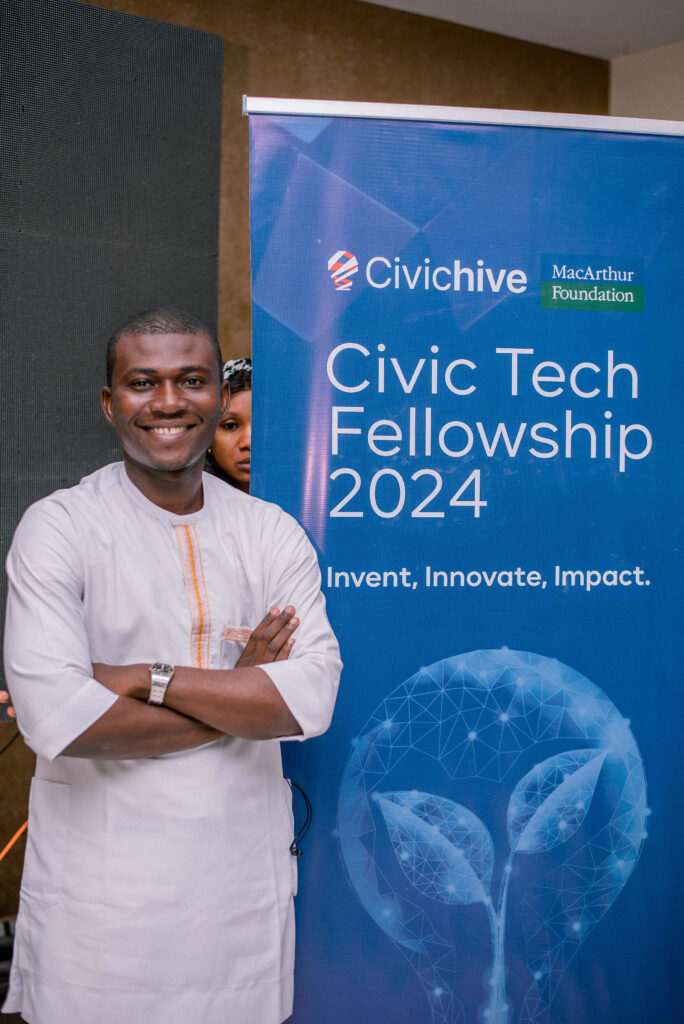Hackathons are widely recognized for fostering creativity, building innovators, and creating lasting solutions. With 1,599 applications across Nigeria for the Civic Hive Fellowship, 14 innovators were selected as successful candidates for the Civic Tech Port Harcourt Regional Hackathon.
The Port Harcourt Hackathon marked the last of the regional hackathons held across 4 regions in Nigeria. The earlier regional hackathons took place in Lagos state, Kano state and Central Nigeria (held virtually) with key thematic areas on Artificial Intelligence for Good, Climate Tech Solution and Advocacy, and Tech for Justice, education, and healthcare.
Hosted in the heart of Rivers, and brings together participants from Rivers, Anambra, Bayelsa, Imo, and Enugu States to present their innovative solutions. The judging panel featured Kue Barinor Paul, legal practitioner and founder of Blocklex Consulting; Ndume Green, founder of Capital TV Nigeria; and Nwidag Kakuubari Doosu, Civil Engineer with expertise in Artificial Intelligence, who provided valuable insights to the candidates. Following a rigorous selection process, four participants were selected to move out to the final for the innovative solutions and their desire to make a difference in their communities.
- The Children4Climate Initiative:
The Port Harcourt Regional Hackathon witnessed the emergence of our youngest Civic Tech Fellow, Varnessa Kayen Varlynton, a passionate environmentalist and climate action advocate from Rivers State, Nigeria. Vanessa is the founder of Egalitarianism for Earth, an NGO committed to environmental justice and climate change mitigation.
She also leads the Children4Climate Initiative, driven by the belief that Generation Alpha can still make a difference, and the TreeTrek Movement, focused on restoring Nigeria’s Garden City. Her presentation addressed the thematic area of climate tech solution and advocacy and emphasized the importance of providing access to climate change resources to teenagers and children.
At CivicHive we promote inclusion of citizens in governance and participation in tackling social issues. Varnessa’s participation presents us with a unique opportunity to extend our advocacy efforts beyond youths and create an inclusive environment for children.
- Eco-cyclers
Ogechi Nwonye-Bernard, the founder of Ecocylcers, gave a presentation in line with climate advocacy and education. Founded in 2022 and registered with the Corporate Affairs Commission, Eco-Cyclers provides affordable waste recycling services to households, businesses, and consumers in Enugu.
Her pitch addressed the importance of developing proper waste management and waste recycling structures, alongside the importance of improving climate literacy among women and young people through targeted awareness campaigns.
The solution aims to reshape the public’s view of waste, making raw materials more accessible while contributing to economic growth with the ultimate goal of promoting a sustainable environment and measurable success for plastic manufacturers both locally and internationally.
- Logalab.ng
Logalab.ng is a civic tech platform that was presented as a solution to tackle the current digital divide faced by the majority of Nigerian citizens, particularly those residing in rural areas. Staying true to emerging trends in Artificial Intelligence (AI), Peter Oyinmiebi, the co-founder of Logalab, briefly highlighted the potential of AI in maximizing his solutions.
He explained the potential of utilizing AI (local-buddy) to ensure open public data availability and access to rural residents. Logalab.ng aims to solve the issue of open data availability and accessibility regarding local government allocations, budgets, projects, and spending. Its goal is to empower people and communities across Nigeria’s 774 local government areas, enhancing grassroots development and governance.
- Project Nanya
Addressing Tech for Justice was Ifunanya Okoye, a former student leader fellow of CivicHive. Ifunanya is the founder of Project Nanya, a people-centered justice initiative created to serve as a centralized hub for information and data repository for victims of injustice, police brutality, delayed trials, and incarceration.
The solution was created due to rampant police brutality in Nigeria and the prolonged detention of awaiting trial inmates, many of whom are held beyond their pre-detention period as a result of poor prosecution, the transfer of Investigating Police Officers (IPO) during cases, or the absence and disappearance of witnesses.
Conclusion
The importance of developing a civic tech space cannot be over-emphasized. Port Harcourt is the fifth most populous city in Nigeria. According to the Stakeholder Democracy Network (SDN), a non-governmental, non-profit organization committed to promoting and protecting human rights in the Niger Delta, the civic tech space in Rivers State is rapidly shrinking. Journalists and women’s rights organizations, in particular, are bearing the brunt, facing harassment, arbitrary arrests, and threats of violence.
The efforts of civic tech stakeholders and organizations are crucial in advancing technology that connects citizens with their government. Since our establishment in 2017, CivicHive has harnessed technology to pioneer innovative approaches to civic engagement.
Social issues have far-reaching effects, disproportionately impacting poor and vulnerable populations. Our civic tech fellowship aims to foster an enabling environment for the development of civic tech tools that address diverse social challenges in creative and inclusive ways.



